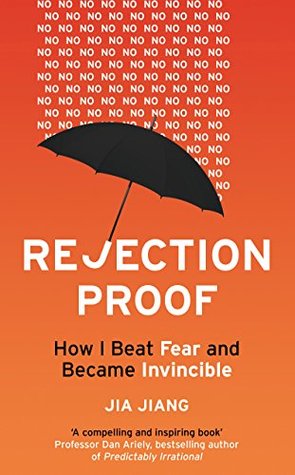More on this book
Community
Kindle Notes & Highlights
by
Jia Jiang
Read between
January 17 - October 3, 2020
These experiences wouldn’t have occurred if I hadn’t sought them out—they existed only because I had asked.
FREEDOM TO ACCEPT YOURSELF
My 100 Days of Rejection taught me how dangerous it is to make assumptions about another person’s thoughts and motives (remember the hairdresser!).
Rejection is human. Neither rejection nor acceptance is the objective truth about the merit of an idea or even a product.
Rejection is an opinion. It reflects the rejector more than the rejectee.
Rejection has a number.
Ask “why” before good-bye.
Retreat, don’t run.
Collaborate, don’t contend.
Switch up, don’t give up.
Motivation.
Self-improvement.
Worthiness.
Character building.
approval-seeking isn’t just my problem—it’s more like an epidemic.
constant approval-seeking causes us to bend ourselves in ways that are not authentic. We feel compelled to put on a façade to appear happy, competent, sophisticated, and worthy so we might be accepted by other people.
In fact, being comfortable with who we are should be a prerequisite—not the result—of seeking others’ approval.
LESSONS
1. Freedom to Ask:
2. Freedom to Accept Yourself:
CHAPTER 12
FINDING POWER
100 DAYS OF REJECTION—BE THE WORST SALESMAN
acceptance and rejection depend primarily on the other person’s situation.
rejection in sales is a good thing because it weeds out people who don’t need or want my service.
conquer fear first and start having fun, then everything, including using other sales techniques, would become much easier.
DETACHMENT FROM RESULTS
In Tao Te Ching, Lao Tzu wrote: “Care about people’s approval and you will be their prisoner. Do your work, then step back, the only path to serenity.”
Detachment shouldn’t necessarily be from your passion or your ideas, but it does help to detach yourself from the results and the possibility of rejection.
According to a LinkedIn study on what its users put on their online profiles, “results oriented” is one of the most common buzzwords people use, because they believe it’s what employers value the most. And they’re often right.
That’s what my rejection journey taught me: to play my best, and not worry about the results—even when the stakes seem impossibly high.
100 DAYS OF REJECTION—FROM INTERVIEWING OBAMA TO FINDING GOOGLE
Google’s acceptance rate is below 0.5 percent, more than ten times lower than that of Harvard.
treat everyone nicely, even when they say no.”
LESSON
1. Detachment from Results:
CHAPTER 13
LIVING A NEW MISSION
Contrary to popular belief, courage—the ability to do something that’s frightening, such as asking for what you need or want, or do the right thing amid rejection and disapproval—is not born but gained. It’s like a muscle. You need to keep exercising it to keep it strong.


